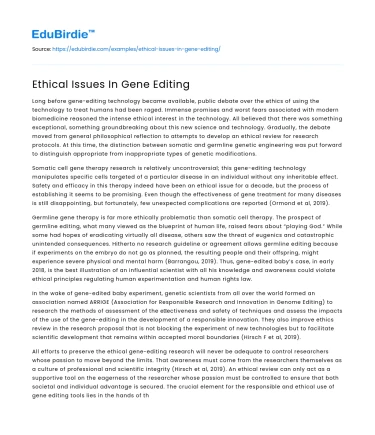Long before gene-editing technology became available, public debate over the ethics of using the technology to treat humans had been raged. Immense promises and worst fears associated with modern biomedicine reasoned the intense ethical interest in the technology. All believed that there was something exceptional, something groundbreaking about this new science and technology. Gradually, the debate moved from general philosophical reflection to attempts to develop an ethical review for research protocols. At this time, the distinction between somatic and germline genetic engineering was put forward to distinguish appropriate from inappropriate types of genetic modifications.
Somatic cell gene therapy research is relatively uncontroversial; this gene-editing technology manipulates specific cells targeted of a particular disease in an individual without any inheritable effect. Safety and efficacy in this therapy indeed have been an ethical issue for a decade, but the process of establishing it seems to be promising. Even though the effectiveness of gene treatment for many diseases is still disappointing, but fortunately, few unexpected complications are reported (Ormond et al, 2019).
Save your time!
We can take care of your essay
- Proper editing and formatting
- Free revision, title page, and bibliography
- Flexible prices and money-back guarantee
Germline gene therapy is far more ethically problematic than somatic cell therapy. The prospect of germline editing, what many viewed as the blueprint of human life, raised fears about “playing God.” While some had hopes of eradicating virtually all disease, others saw the threat of eugenics and catastrophic unintended consequences. Hitherto no research guideline or agreement allows germline editing because if experiments on the embryo do not go as planned, the resulting people and their offspring, might experience severe physical and mental harm (Barrangou, 2019). Thus, gene-edited baby’s case, in early 2018, is the best illustration of an influential scientist with all his knowledge and awareness could violate ethical principles regulating human experimentation and human rights law.
In the wake of gene-edited baby experiment, genetic scientists from all over the world formed an association named ARRIGE (Association for Responsible Research and Innovation in Genome Editing) to research the methods of assessment of the effectiveness and safety of techniques and assess the impacts of the use of the gene-editing in the development of a responsible innovation. They also improve ethics review in the research proposal that is not blocking the experiment of new technologies but to facilitate scientific development that remains within accepted moral boundaries (Hirsch F et al, 2019).
All efforts to preserve the ethical gene-editing research will never be adequate to control researchers whose passion to move beyond the limits. That awareness must come from the researchers themselves as a culture of professional and scientific integrity (Hirsch et al, 2019). An ethical review can only act as a supportive tool on the eagerness of the researcher whose passion must be controlled to ensure that both societal and individual advantage is secured. The crucial element for the responsible and ethical use of gene editing tools lies in the hands of the scientist in the field and the laboratory.
Finally, science is here, and we must anticipate its development. The key is how to regulate it and how to encourage scientists’ awareness so that basic ethical norms are not violated, and harms are minimized. Researcher ethics awareness is vital so that decent fruits from the tree of science can be obtained. Gene technologies represent the paradigm of the potential benefits and perils of modern science.






 Stuck on your essay?
Stuck on your essay?

